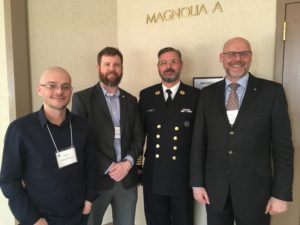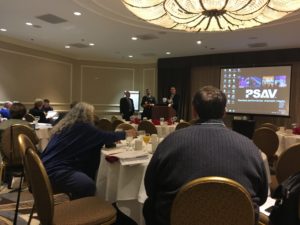US Chaplains meet Dutch Humanist Chaplains
This January, the Dutch military agreed to send representatives to visit the US. The United States has a troubling shortage of Humanist chaplains. Despite an promising memorandum from the Department of Defense last year, 0 is the exact number of Humanist Chaplains currently serving in the military while atheists and agnostics now outnumber all non-Christian denominations combined. The Dutch military in the other hand has a thriving Humanist chaplaincy, nearly 30% if all its chaplains. They bring over 50 years of institutional experience with Humanist Chaplains that the US chaplaincy can learn from.

From left: Ben Iten, Jason Torpy, Erwin Kamp, Ron Geenen
Attending from the Netherlands were Ron Geenen, Head of all Dutch Military chaplains, MBA, and Officer of the Viscounty of Kingsfort, and Colonel Erwin Kamp, Endorser for Humanist Military Chaplains and himself a retired after a career as a chaplain in the Dutch military. He also wrote the book Raadsman, heeft u nog raad? (Chaplain, do you have any advice?) recounting his work as a Humanist Navy Chaplain at the Royal Dutch Marines. Mr Geenen, while not a chaplain, previously served for 30 years running the Dutch military reintegration program to help service members returning from military service overseas. They have each dedicated their lives to the emotional care of military personnel, and it was inspiring to hear them tell their stories.
I’d like to extend a special thank-you for the generosity in this visit. MAAF made contact and coordinated the invitations through several agencies, but Chaplain Kamp and Mr Geenen came at their own expense to interact with our military and to help serve Americans as they have served the Dutch people during their decades of service. In an article on the Dutch Humanist site, Col Kamp talked about the successful visit to the US.
Joining Dutch visitors were two Humanist chaplains. One was Jason Callahan, an APC Board Certified Chaplain and instructor at Virginia Commonwealth University Hospital. The other was Ben Iten, a CPE supervisor candidate from OSU. These two are among over 30 paid Humanist chaplains around the country endorsed by the Humanist Society. These chaplains show we are part of the process of helping service members, patients, and prisoners just as Christian and Buddhist and Jewish chaplains are.
As a Humanist Chaplain I do not have to prove anything. Ask our soldiers, marines and sailors about their experiences. 54 Years of Humanist Chaplancy in the Dutch Armed Forces says enough!” – Chaplain Colonel Erwin Kamp

COMISS Network presentation of Dutch appreciation
The events going on were the Coalition in Ministry in Specialized Settings, a professional organization for dialog among chaplains, employers, administrators, endorsers, and publishers. Following COMISS were events hosted by NCMAF, ECVAC, and AFCB, which are various organizations focused on serving military personnel and veterans. While we had no invitation to these events, the co-location allowed a lot of interaction with those personnel as well. MAAF and the Dutch personnel also visited the Pentagon to meet with officials and to network for potential future work in service of humanists and other nontheists in the US military. Pentagon personnel were very gracious to speak with us and to tour the Pentagon. At COMISS specifically, attending were leaders of many national standards-makers for the profession of the chaplaincy, including APC, ACPE, and CPSP. Understanding the function and value of all these organizations is too complicated for this article, but in total, there were over 100 senior chaplains and chaplain-leaders from all over the country. These included chaplain endorsers, employers, administers, and military chaplain recruiters. They all saw actual Humanist Chaplains in the flesh and were able to make a professional connection. The message they received and hopefully heard is that Humanist chaplaincy is real. And that Humanist chaplaincy is can help those military personnel, veterans, patients, prisoners, and others in their care.
I extend thanks also to COMISS and those at the events who were welcoming to us. These events have been going on with Humanist representation for over 5 years. Humanists are making progress, and it is due to those non-Humanists in power who make a place for us in their events and workplaces. We know that humanists are already among the communities chaplains care for, and there is hope that soon the profession of the chaplaincy will be more and more open to learning about humanists and welcoming humanists to help in the hard and important work of chaplaincy.
